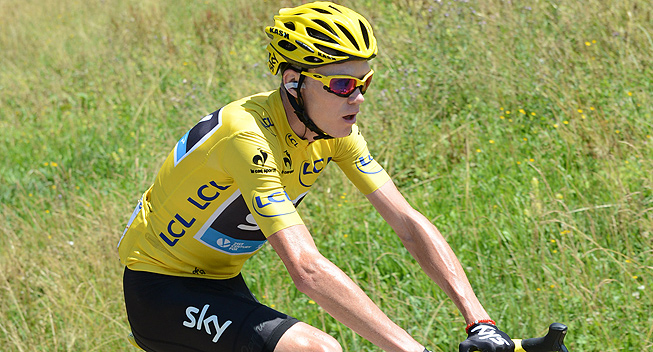With only one time trial and five summit finishes, the course for the 2014 Tour de France has been described as one for the climbers and several people have suggested that the design of the race is a disadvantage for Chris Froome (Sky). The defending champion is, however, confident that the winner will be a much more versatile athlete than just a pure uphill specialist.
When the course for 2014 Tour de France was unveiled last Wednesday, people were quick to point out that the limited amount of time trialing was a clear disadvantage for defending champion Chris Froome who is much stronger than his rivals in the race against the clock. With 5 uphill finishes suiting a pure climber like Nairo Quintana, it has been suggested that we could be in for a much fiercer battle than we saw in this year's one-man show.
At the presentation, Froome and Sky principal Dave Brailsford were keen to point out that Froome is first and foremost a climber who out-climbed his rivals in two uphill finishes in this year's Tour de France. Hence, the they claim that the sheer amount of climbing is no disadvantage for the defending champion
Speaking to the press while in Japan for the Saitama Criterium - an ASO organized event which he won - Froome was, however, equally as keen to point out that no one is going to win the Tour by virtue of their climbing legs alone. The winner of the world's biggest bike race will be a much more versatile athlete and he was particularly keen to stress the importance of the 54km, flat time trial on the penultimate day.
“We saw what the time gaps were like with a time trial of just over 30km in this year’s Tour, in the first flat time trial," he said. "You can only imagine what the time gaps are going to be like in the 50km time trial and the pure climbers are going to have to battle with that."
Many people have pointed out that the first week is going to be a real survival battle as the first big climbs will not make their entrance until after more than a week of racing. Nervousness, wind and cobbles have the potential to whittle down the field of contenders even before they have raced up one single mountain and Froome agreed with the assessment.
“The cobblestones are also an area where pure climbers could struggle and there are a lot of stages in between – the lumpy stages in the UK, for example – where fighting for position on the flat and in crosswinds are all going to come into play," he added. So I wouldn’t necessarily say it’s a race for the pure climbers."
The race is set to be decided in the Pyrenees in the final week with three consecutive stage in the brutal mountain range. The final two of those - the summit finishes on Pla d'Adet and Hautacam - are very short, intense stages which does not necessarily suit an endurance rider like Froome who excelled on the very long stage to Mont Ventoux in this year's race.
“Personally I prefer longer [mountain stages] but shorter ones are maybe a bit more explosive and exciting, and you can’t give the breakaway as much time," he said. "It might promote a little bit more aggressive racing."
The Tour de France starts on July 5 in Leeds.
| Gilles COOREVITS 28 years | today |
| Tomoya KANEKO 37 years | today |
| Jens KEUKELEIRE 36 years | today |
| Michal NABIALEK 37 years | today |
| Jacob Gye MADSEN 35 years | today |
© CyclingQuotes.com









